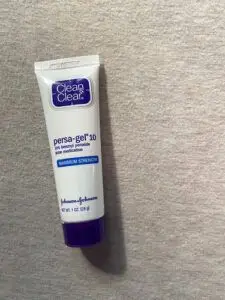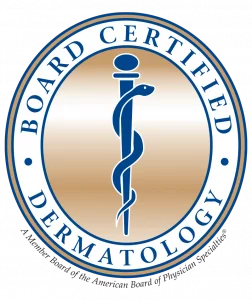
On March 6, 2024, Valisure LLC, an independent testing laboratory in Connecticut, filed a petition with the FDA requesting a recall of Benzoyl Peroxide (BPO) products containing or forming high levels of Benzene, a known human carcinogen. This report questioned the safety of benzoyl peroxide for the treatment of acne and challenged current treatment guidelines that recommend BPO as a first-line therapy for acne. This blog will summarize the current data and help navigate the concerns raised.

What is Benzoyl Peroxide (BPO)?
Benzoyl peroxide (BPO) is a common topical medication for acne. BPO kills acne-causing bacteria within the pores. It also helps unclog pores and is particularly effective when combined with other therapies. In contrast to topical antibiotics, microbial resistance to benzoyl peroxide has not been reported. Furthermore, BPO reduces bacterial resistance when someone uses topical or oral antibiotics for acne. Many BPO preparations are available in over-the-counter and prescription formulations. These include bar soaps, washes, gels, lotions, creams, foams, and pads in concentrations ranging from 2.5% to 10%, as well as products that combine benzoyl peroxide with clindamycin, tretinoin, or adapalene (Acne TBC Combo and Acne Duo Plus sold at Craig Singer MD Dermatology).
What is Benzene?
Benzene is a well-recognized carcinogen, and chronic, low-dose exposure may lead to cancer, with acute myeloid leukemia (AML) being the most frequently observed type.
According to the CDC, Benzene is a colorless, highly flammable chemical used widely in the U.S. to make products such as drugs, detergents, dyes, plastics, and lubricants. It is also found naturally in gasoline and cigarette smoke. Benzene can cause cells not to work correctly. The severity of the condition depends on the amount, route, and length of time of exposure, as well as the age and preexisting medical condition of the exposed person. The FDA limit on Benzene in personal care products is two ppm.
Who is Valisure?
Valisure LLC is an independent testing laboratory in Connecticut hired by the U.S. Department of Defense to check the quality of drugs used by the U.S. military.
What are the essential findings of the Valisure study?
Some forms of BPO degrade into Benzene over time (months to years), particularly with exposure to very high temperatures (greater than 122 degrees F). Even if a product containing BPO passes FDA inspection during manufacture, it can subsequently develop detectable levels of Benzene. Benzene can also form from BPO at room temperature after several years on the shelf and can aerosolize outside the tube at toxic levels.
Valisure tested 66 acne products containing benzoyl peroxide for potential benzene production. After extremely high temperatures, some products produced more than 800 times the restricted FDA concentration of Benzene. Others did not demonstrate high levels of Benzene.
Some preparations of benzoyl peroxide have improved stability as compared to others. However, we have limited data to support the best way to stabilize BPO.
The lowest producers of benzene studied by Valisure are shown below:

- Valisure did not test any BPO product manufactured by SKNV (the pharmaceutical company that manufactures prescription acne products for Craig Singer MD Dermatology).
- Importantly, SKNV does not use benzene as an ingredient in any of its formulas and tests its Benzoyl Peroxide products in accordance with FDA regulations and cGMP requirements.
- SKNV’s Benzoyl Peroxide drug products contain antioxidants such as Butylated Hydroxytoluene NF (“BHT”) and Ascorbyl Palitate NF, depending on the formulation. Valisure’s petition states that “the addition of an antioxidant [such as BHT] can substantially reduce the formation of benzene [event at extreme temperatures] by over 98%.”
The FDA still needs to validate Valisure’s data, so it is premature to make definitive conclusions based on the current data.
What are the current recommendations for BPO use?
We should avoid definitive conclusions until after the FDA validates Valisure’s results. In the meantime:
- Discard BPO products after 3 to 6 months of use
- Keep your BPO product at room temperature or in a refrigerator. Never store it in a car or in hot temperatures.
- Consider alternative OTC acne products such as azaleic, salicylic, and adapalene.









